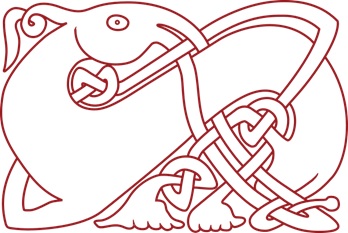Old Engli.sh
The Portal to the Language of the Anglo-Saxons
Read another, randomly chosen, past Old-Engli.sh News article:
Dictionary of Old English keeps on growing at a steady pace: The 2012 Progress Report
April 2013
April 2016
Dictionary of Old English One Third Complete: The 2015 Progress Report
2015 was a remarkable year for the Dictionary of Old English (DOE). The annual progress report for 2015 projects completion of the letter H, presents system upgrades, and announces important staff changes. |  Dictionary of Old English to publish letter H |
The Dictionary of Old English (DOE) has all but completed the letter H in 2015. With only two headwords remaining, the letter is on track to be published in the first half of 2016. This is momentous considering that H has nearly 3,000 headwords and makes up a larger percentage of the Old English vocabulary than any other letter except S. Publication of the letter H will mark the conclusion of the first third of the DOE project.
Moreover, the DOE is now making more resources more easily available through the latest technology. New and improved versions of DOE online and the DOE Web Corpus will be released upon completion of the letter H. The updates will feature better user experience and new search options for the Web Corpus, including wild-card searches. Further, a new Android app for the list of Old English texts can now be downloaded from the DOE website.
With regards to promotion and outreach, the DOE sponsored two lectures this year: Javier Arista and Ana López from the University of La Rioja, Spain reported on the Nerthus Project in January, and Professor Dabney Bankert of James Madison University gave a lecture on the making of Joseph Bosworth’s Dictionary in October. But the DOE staff members themselves were busy too. Roy Liuzza provided an update on the development of the DOE to the Old English Executive Committee at the Modern Language Association (MLA) convention in Vancouver, and also represented along with Robert Getz the DOE at the International Congress on Medieval Studies in Kalamazoo.
There were quite a few changes to the DOE team. Roy Liuzza resigned as Chief Editor in July 2015 for family reasons and is currently a professor at the Department of English at the University of Tennessee. As a consequence, the DOE, the Centre for Medieval Studies and the Department of English at the University of Toronto are searching for a new Angus Cameron Professor of Old English and Chief Editor of the DOE. Yet, Liuzza remains active at the DOE, leading a fundraising campaign to match an instalment of a Challenge Grant from the Triangle Community Foundation and, like previous Chief Editor Toni Healey, continues to work as an adviser to the DOE. Recent additions to the editorial team include Robert Getz and Stephen Pelle as interim co-editors; and Valentine Pakis as third drafting editor. Nobuko Imataki joined the DOE as a visiting scholar from Nihon University in Tokyo, Japan. He researched the use of preterite-present verbs in Beowulf.
Overall, all work remains on track, and the DOE continues to provide amazing state-of-the art lexicography.
Moreover, the DOE is now making more resources more easily available through the latest technology. New and improved versions of DOE online and the DOE Web Corpus will be released upon completion of the letter H. The updates will feature better user experience and new search options for the Web Corpus, including wild-card searches. Further, a new Android app for the list of Old English texts can now be downloaded from the DOE website.
With regards to promotion and outreach, the DOE sponsored two lectures this year: Javier Arista and Ana López from the University of La Rioja, Spain reported on the Nerthus Project in January, and Professor Dabney Bankert of James Madison University gave a lecture on the making of Joseph Bosworth’s Dictionary in October. But the DOE staff members themselves were busy too. Roy Liuzza provided an update on the development of the DOE to the Old English Executive Committee at the Modern Language Association (MLA) convention in Vancouver, and also represented along with Robert Getz the DOE at the International Congress on Medieval Studies in Kalamazoo.
There were quite a few changes to the DOE team. Roy Liuzza resigned as Chief Editor in July 2015 for family reasons and is currently a professor at the Department of English at the University of Tennessee. As a consequence, the DOE, the Centre for Medieval Studies and the Department of English at the University of Toronto are searching for a new Angus Cameron Professor of Old English and Chief Editor of the DOE. Yet, Liuzza remains active at the DOE, leading a fundraising campaign to match an instalment of a Challenge Grant from the Triangle Community Foundation and, like previous Chief Editor Toni Healey, continues to work as an adviser to the DOE. Recent additions to the editorial team include Robert Getz and Stephen Pelle as interim co-editors; and Valentine Pakis as third drafting editor. Nobuko Imataki joined the DOE as a visiting scholar from Nihon University in Tokyo, Japan. He researched the use of preterite-present verbs in Beowulf.
Overall, all work remains on track, and the DOE continues to provide amazing state-of-the art lexicography.
- Find more OE news at www.oenewsletter.org
- Download the Dictionary of Old English 2015 Progress Report